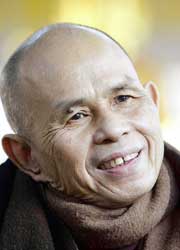My respect for Buddhists, and one especially
by BREDA O'BRIEN, The Irish Times, Sept 17, 2011
Dublin, Ireland -- GIVEN THE controversies afflicting the Catholic Church, and the general rise of scepticism, you might think Irish people have lost their appetite for spirituality. Not so. There are all sorts of manifestations of a search for meaning, from young people attending World Youth Day to the proliferation of Christian contemplative prayer groups.
 << Ven. Thich Nhat Hahn
<< Ven. Thich Nhat Hahn
Interestingly, there are now also many sanghas ( Buddhist communities) appearing in Ireland. Mindfulness Ireland, an umbrella body for the practice of meditation and mindful living, lists 14 on its website.
Some time ago, I wrote an article with what I thought was a gently teasing reference to the Dalai Lama being the acceptable face of religion for people who would normally scorn any form of supernaturalism.
Looking now at the piece, it’s not that good. Not only does it not say anything particularly original about my purported theme, the difference between heroes and celebrities, but it almost entirely conceals my own long-held respect for Buddhism. That’s a good trick, to misrepresent yourself in your own column.
So I had better tread carefully when I say I have the greatest respect for the Dalai Lama, but he is not my favourite Buddhist teacher. That honour (or liability, depending on your opinion of this columnist) goes to Thich Nhat Hanh, a Vietnamese Buddhist.
He’s coming to Ireland next April at the invitation of Mindfulness Ireland. Given that he is now in his mid-80s, this is a rare opportunity. He will be conducting a three-day retreat in Killarney, as well as a public talk in Dublin. (Details available from
http://mindfulness-ireland.org/.)
Thich Nhat Hanh (pronounced something like Tik Naw Tan) has had an extraordinary life. Born in Vietnam in 1926, he joined a Buddhist monastery at 16. From very early on, he believed Buddhism needed to modernise, but he could not have foreseen how far his path would carry him.
He is widely recognised as a proponent of “engaged Buddhism” – applying the insights derived from Buddhist meditation to relieving suffering of a social, political or environmental nature. Engaged Buddhism for him meant risking his life during the long, bloody Indochina and Vietnam wars, taking food to beleaguered villagers and helping wounded soldiers of all sides.
In 1964 he founded the School of Youth for Social Service in Saigon. The organisation began rebuilding bombed villages and setting up schools, medical centres and agricultural co-operatives.
His work brought him into conflict both with conservative Buddhists and the government. In 1966 when he went to the US on a peace mission, he was barred from returning, and then spent 40 years in exile. In the US, he campaigned tirelessly for peace. He is credited with persuading Martin Luther King to declare against the war in Vietnam, and in his turn King nominated him for the Nobel Peace Prize.
Around this time, Thich Nhat Hanh, or Thay as he is known to his followers, had two audiences with Pope Paul VI. He also met and befriended Thomas Merton, the Trappist monk who inspired thousands of religious seekers.
Merton told his students, “Just the way he opens the door and enters a room demonstrates his understanding. He is a true monk.” He also wrote a beautiful piece, “Thich Nhat Hanh is my brother”. Merton talked about the “bonds of a new solidarity and a new brotherhood which is beginning to be evident on all the five continents and which cuts across all political, religious and cultural lines”.
For me, this is one of the most profoundly interesting aspects of Thich Nhat Hanh. Although steeped in Buddhism, he has deep respect for other traditions, and it seems to me, a genuine love of Jesus. He does not see Jesus as a Christian might do, but the title of one of his books, Buddha and Jesus as Brothers, shows how deeply he reveres him.
I suspect Thich Nhat Hanh may treasure the roots of Christianity better than some of us, including this writer, who have the cheek to call ourselves Christian.
In 1982, Thay set up Plum Village, a Buddhist monastery in France, which attracts people from all over the world, including many Irish.
Without in any way wishing to downplay the great differences on a theological level, the more I study the mystics of every tradition, the more they seem to have in common when it comes to the best way to live a meaningful human life.
The practice of mindfulness is the great insight of Buddhism. On the Plum Village website, mindfulness is defined as “the continuous practice of touching life deeply in every moment of daily life. To be mindful is to be truly alive, present and at one with those around you and with what you are doing.”
That does not seem to me to be greatly different to Therese of Lisieux, or Meister Eckhart. She says, “If I did not simply live from one moment to another, it would be impossible for me to be patient, but I only look at the present, I forget the past, and I take good care not to forestall the future.” She also talks of doing “little things with great love”.
Mindfulness can be adopted as a purely secular practice, and has been embraced by psychologists in the treatment of depression. Thich Nhat Hanh speaks often of the western inability to relax completely, and therefore to heal in body and spirit.
There will be a mindfulness retreat this October 28th to 31st in Kerdiffstown House in Kildare, run by sisters from Plum Village, and a series of talks in Cork, Galway, Dublin and Belfast given by monks of the community.

 << Ven. Thich Nhat Hahn
<< Ven. Thich Nhat Hahn